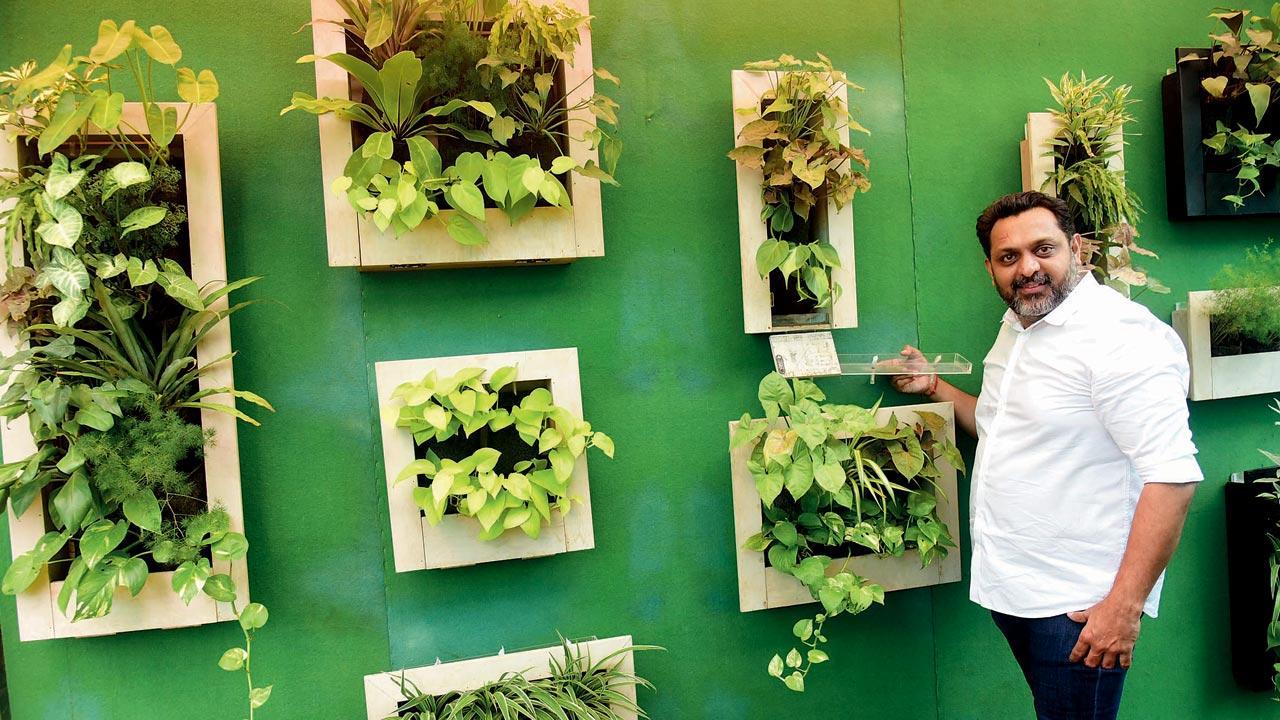An urban farmer is inspiring corporates to introduce plants in their workplace and growing breathing walls of green that decide when they would like to be watered

Dipen Dedhia at his nursery in Grant Road East. The entrepreneur, who has created vertical gardens for corporates across India, says ferns, monstera, philodendron, palms and pothos are preferred. Pic/Suresh Karkera
There are plenty of prescriptions out there to help reduce stress at work—talk to your supervisor, take a power nap, go for a short walk, listen to music. But, if you ask Mumbai-based urban farmer Dipen Dedhia, his answer is simple: get an indoor plant and gaze at it occasionally. This winning formula is backed by research. Scientists at the University of Hyogo in Awaji, Japan, conducted a study to ascertain whether plants can improve your mental health at work. They instructed 63 participants, who had full-time desk jobs to take a short break when they experienced fatigue, and spend a couple of minutes intentionally looking at a desk plant. The findings, published in the HortTechnology journal, showed that over the course of four weeks, about 27 per cent of participants reported a significant reduction in anxiety after the intervention.
ADVERTISEMENT
No surprise then that corporate biggies like Infosys, TATA Motors, TCS, Thomas Cook, Navneet Publications and Adobe are on Dedhia’s roster. “While researching for these firms, we realised that the working hours at most corporate offices are nothing less than eight to nine. By the end of the second half, employee productivity drops invariably. Which is why architects have now started installing plants in walkways, passages, dining and recreation areas. Scientifically, plants are the best stress busters.” Dedhia says the tried and tested way of gazing at a plant for 30 seconds after sitting in front of the screen for 30 minutes, can improve your state of mind. “You’ll notice how your eyes will begin to relax and you’ll feel refreshed enough to return to your desk.”
His startup Rising Gardens, he says, is India’s first speciality hub for vertical gardens in felt system. It is a fabric-based pocket green wall system for both indoor and outdoor application. According to him, felt material allows for the rapid entrenching of the plant roots. “Here, the fabric does the job of the soil; the roots hold on it and grow. Considering the holding structure is neutral [does not contain nutrients], we add liquid nutrients in a drip system to enable the roots to grow. The advantage is that the entire area of the garden becomes the root zone for the plant.” Over the years, he has helped create breathable walls and urban kitchen rooftop gardens for homes and offices. The plants best suited for homes and corporate offices are ferns, monstera, philodendron, palms, pothos (money plant), fiddle fig leaf and snake plants, also called mother-in-law’s tongue, depending on the location and accessibility to sunlight. Plants are said to be effective at eliminating Volatile Organic Compounds, which are chemicals emitted into the air from products or processes, and reducing stress. Until now, Dedhia has set up close to 100 vertical gardens and breathing walls, converting dead walls into green spaces, in corporate offices across India.
He first encountered vertical gardens in Paris, while on a vacation in 2009. Inspired by the ideology of Patrick Blanc, the father of vertical gardens, Dedhia has tried to Indianise the approach to suit the tropical conditions here. He says a common reservation among clients is that the plants attract mosquitoes, which is now the chief cause of dengue and malaria. “I’ve been living with plants for 24 years, and if that was the case, I should have passed on long ago. What breeds mosquitoes are damp areas and stagnant water,” he explains.
It’s not uncommon for him to come across visitors who remark, “Too bad, I don’t have a green thumb”. The main reason that people tend to fail at gardening, according to him, is that they overwater and don’t really understand how a plant grows. Incidentally, India has the highest ratio of plants dying in homes. The best way to tell if your plants need water is to stick your finger about an inch into the soil mix, and if it feels dry, pour water. If you detect dampness, wait another day and check again. The warmer the temperature, drier the air, or brighter the light, the more often you should check.
Currently, Dedhia is working on a mechanism with an in-house scientist, to install sensors and smart controllers in vertical gardens. “Instead of an automatic irrigation system that works on timing and quantity based on our discretion, we are installing systems that will gauge the moisture levels, Electrical Conductivity (EC) and pH range of the plant. We are giving the plant the freedom to choose whether it wants water or not. For example, if the moisture percentage has come down to 40, only then will the watering irrigation start. It will stop once it hits 75 per cent. The trials have been successful and the chances of fungal disease has reduced by 80 per cent.” This means that maintenance by his staff for the vertical walls has reduced. But he’s not complaining.
30:30
The ratio in seconds and minutes respectively of gazing at a plant on your desk after spending time in front of the computer
 Subscribe today by clicking the link and stay updated with the latest news!" Click here!
Subscribe today by clicking the link and stay updated with the latest news!" Click here!






